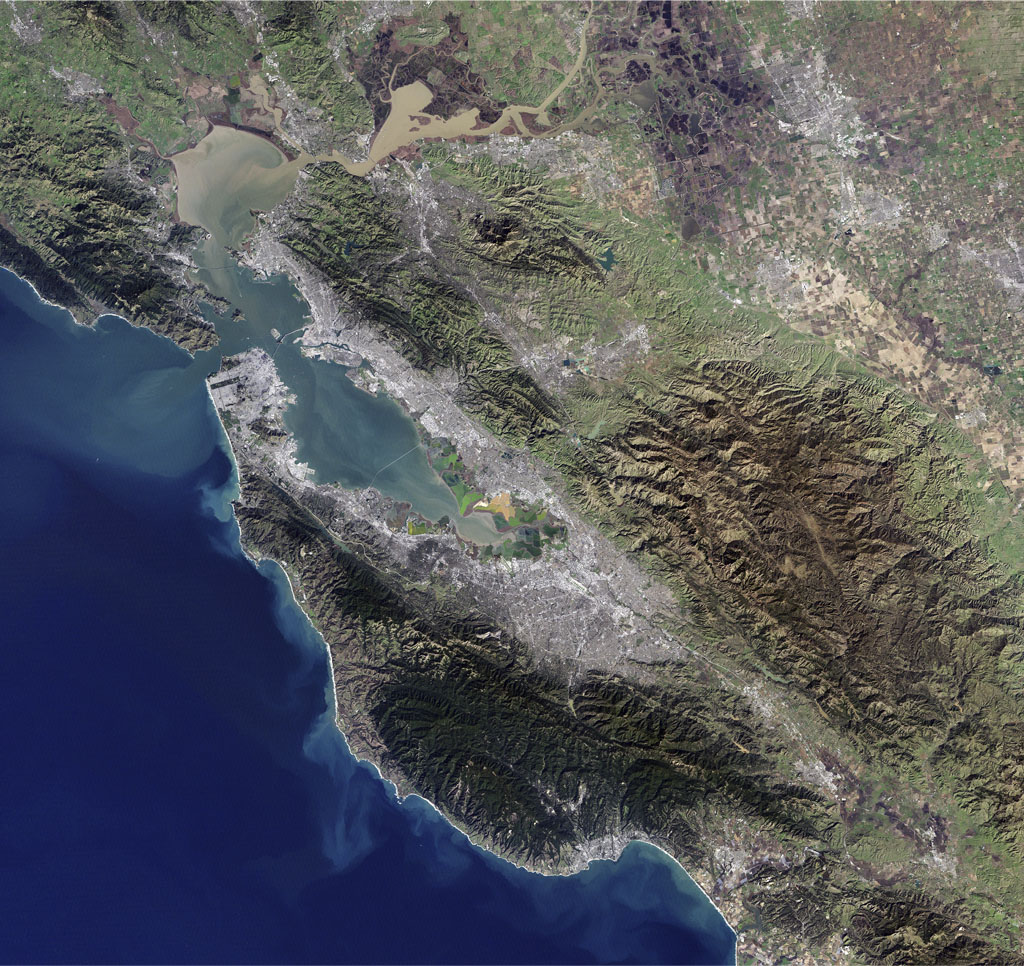26-01-17 // THE CITY IS DEAD! LONG LIVE URBANIZATION… INTERVIEW WITH LARS LERUP

San Francisco Bay Area, ©USGS/ESA
Bernd Upmeyer spoke with Lars Lerup about “Decentralised Urbanism”. Lerup, a designer and writer, is a Professor of Architecture at the Rice School of Architecture. Previously, he taught for many years at the University of California at Berkeley. His work focuses on the intersection of nature and culture in the contemporary American metropolis, and on Houston in particular. He is currently finishing up work on a new book, entitled The Continuous City, which examines the consequences the city’s relentless growth and expansion has had on various natural systems, and further, how those consequences will effect the future of the city. Other books of note include After the City, “Room”, Planned Assaults, and Building the Unfinished. The interview took place on January 26, 2017.
Decentralised Urbanism in the UK, US, and the Netherlands
Bernd Upmeyer: We recently became interested in the question of what helps cities to thrive socially, politically, spatially, and especially economically. In our last MONU issue from October last year, we wanted to find out, for example, how cities in countries that recently gained independence can develop successfully. We called this last issue “Independent Urbanism”. To a certain extent with this new issue on “Decentralised Urbanism” we aim to continue this debate. In addition, this new issue was inspired by the discussion on “Brexit” and the fact that England tries to soften the power of its capital London in order gradually to get rid of the country’s extraordinarily centralised situation empowering cities such as Birmingham, Liverpool, or Manchester. And we assume that what works on the scale of a larger region – or even nation – would probably function within singular cities, and particularly within big cities and their metropolitan areas. Do you think that Birmingham, Liverpool, and Manchester will thrive if England was organized in a more decentralised way?
Lars Lerup: That is a question for some wonderfully courageous futurists, and I’m not one of those. I prefer to stay with the here and now. That is so hard to understand, and even more difficult to describe, one is forced to speculate about the future. I think it is politically necessary to do it. This is particularly true as England is now becoming more interested in having more power over its own destiny. London clearly is an international city and if it is suddenly going to distribute some of its fortunes to the rest of the country, it is going to get complicated.
What I find interesting in relation to your topic of “Decentralised Urbanism” are self-driving cars. They no longer belong to a futurist proposition. If I buy the best Tesla and I go to a restaurant I will “tell” it to park and when I come out it will pick me up and if I am too drunk it can drive me home. This will have enormous consequences for cities and their organization that we only now begin to understand. We have to catch up with these changes, which is not going to be easy.
But what is going to happen in England, London, and with Brexit? Who knows? Will there be, for example, a shift towards cities like Amsterdam or Frankfurt? Anybody who attempts to predict the future related to this is going to be wrong.
BU: I find it intriguing that you mentioned self-driving cars. They will for sure make life for people easier in decentralised urban areas.
LL: Of course. We have about 50 million square feet of parking space in Texas. But do you then still need to have a parking garage next to your office? No, because the self-driving car will pick you up and deliver you. And it can drive for 24 hours, provided that it doesn’t break down. These cars will be shared by several people, so there will be no car ownership anymore, just use-leases. And all cars are going to look the same eventually. They will only differ in regard to what kind of extras you have in the car: massage-machine, weight-lifting apparatus, cocktail bar, TV, etc. But obviously this is going to lead to dramatic changes in expanded cities like the ones you have in America, which are dominated by single-family houses accessed by private cars…
…the complete interview was published in MONU #26 on the topic of Decentralised Urbanism on April 18, 2017.
Title: The City Is Dead! Long Live Urbanization…
Project: Interview with Lars Lerup
Date: January 2017
Type: Commissioned interview
Topic: Decentralised Urbanism
Organizer: MONU
Status: Published
Publications: MONU #26, P. 4-11
Interviewer: Bernd Upmeyer